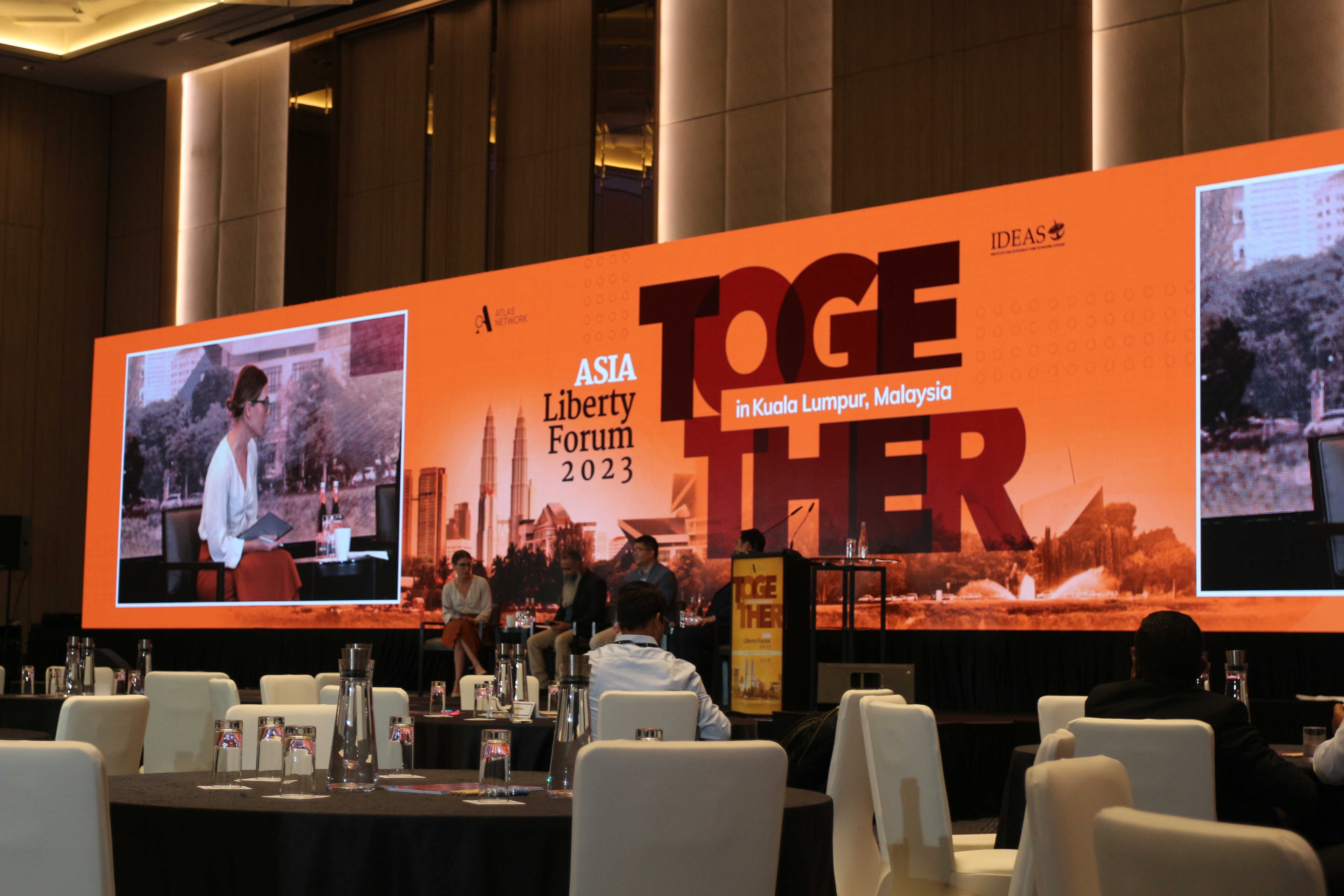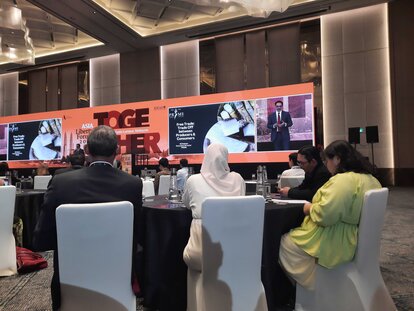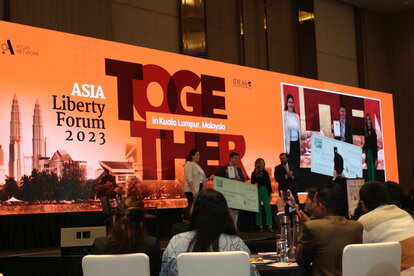LibertyForum
Asia Liberty Forum 2023

The Asia Liberty Forum (ALF) 2023 is a forum by Atlas Network and this year co-hosted by Institute for Democracy and Economic Affairs (IDEAS). The forum took place in Kuala Lumpur, Malaysia and held from 07 – 08 September 2023. The event gather students, scholars thinkers, and friends of human freedom to learn and connect with each other and also to gain knowledge and network with captivating speakers.
This event was attended by several FNF colleagues in the region; Vera and Nesya from FNF Malaysia, Kewalin from FNF Regional Office Bangkok, Sungeun Lim from FNF Korea, and Le Thi Thu Trang from FNF Vietnam.
The event kicked off with an opening session featuring Dr. Tom Palmer, Executive Vice President for International Programs at Atlas Network, and Tunku Zain Al-‘Abidin Tuanku Muhriz, Chairman of the Institute for Democracy and Economic Affairs (IDEAS) Board of Directors. Dr. Palmer emphasized that the forum was designed to enhance our effectiveness in advancing shared causes. He hoped that the sessions would provide inspiration and opportunities for networking, he also emphasized that the forum aimed to create a productive space for open discussions on various issues important to advocates of liberty.
The future is yet to be written, but the people here will be the authors of the chapters for each of your countries—because you are the ones who are going to shape the future by standing up for the principles and values of liberty
Following the opening session, there were cornerstone talks featuring speakers from different organizations sharing their work:
- Anthea Haryoko from the Center for Indonesian Policy Studies (CIPS) talked about how they become who they are today, how they won projects like the Regional Comprehensive Economic Partnership (RCEP). She shared three things that could help an organization to be well positioned, First, Consistency, CIPS started from advocacy with lower food prices and expand wider to economic. Second, Chase Opportunity by taking risk, where we create our own event or opportunity and even when it doesn’t work, you’re name is there anyway. Third, Build rapport or Reputation.
- Amit Chandra from the Centre for Civil Society, India, explained how their organization worked to improve livelihoods and reduce the gap between citizens and the state.
- Ali Salman from PRIME Institute, Pakistan, outlined steps to advance the sugar market in Pakistan by minimizing government intervention and promoting competition.
- Anu Maria Francis from the Centre for Public Policy Research (CPPR), India, focused on liberalizing entry-level legal barriers for women's economic rights.
- Bryan Cheang from the Adam Smith Center, Singapore, talked about Singapore politic and economic. He mentioned that paradigmatic example of authoritarian capitalism is highly ranked on economic freedom but closed political system. Its wealth has been achieved at the expense of individual liberty. He also stressed that Singapore is not a hellhole, and is very wealthy, so lots to learn from.
Fortune Favours The Prepared

After these talks, breakout sessions began, with one focusing on "Habits of Highly Successful Atlas Network Partners." Participants could choose from three stations, and one of them explored tailoring messages to different target audiences, and I attended this session by Dr. Ayemen Fatima – Deputy Director, Student for Liberty (SFL). Some of the key takeaways from her session was to know and understand what works in the country. Join Facebook Groups for example to get better understand what are the current concerns, what they need. When it comes to organizing an event we should ask ourselves, what values that we can add to them, and what their expectations are when they join the event or organization.

After the breakout session, we move on to “Luncheon: Stories of Impact”, where the discussion explored the success stories of this year’s Asia Liberty Awards finalists. The finalists were:
- Basanta Adhikari – Founder & Director, Bikalpa – an alternative, with their motorbike license project.
- Joseph Emmanuel Angeles – Board of Trustees Member, Foundation for Economic Freedom with project around facilitate greater foreign investment and participation in the country's natural resource sector, including renewable energy, by revising the constitutional provision that has historically imposed restrictions on such investments.
- Anton Rizki – Center for Indonesian Policy Studies (CIPS) with their project helping the code editing Ministry of Economic Affairs to prepare action plan that would look at key issues or key prioritize so the utilization rate of Regional Comprehensive Economic Partnership (RCEP) agreement is much higher and Indonesia gain benefit of it.
After lunch, I attended another break out session titled "Navigating Controversial Issues in Traditional Societies" with speakers Tasnim Idriss from Islam and Liberty Network, Nanang Sunandar from INDEKS, and Shubho Roy from Trayas Foundation. They discussed individual rights, political and economic freedom, and women's employment restrictions, also mentioning the decline of liberalism in their countries.
During 2023 Asia Liberty Awards Dinner, it is announced that the winner of 2023 Asia Liberty Award is Basanta Adhikari from Bikalpa – an alternative, with their motorbike license project
The next day began with a discussion titled "The Road to Influence: Building Credibility and Establishing Your Organization’s Voice," featuring Aira Azhari from IDEAS, Deependra Chamlagain from the Samriddhi Foundation in Nepal, and Maria Charina Ubarra from the Foundation for Economic Freedom, moderated by Tom Palmer.
During the discussion, several vital questions were raised, all revolving around the theme of maintaining a cohesive and credible approach. These questions included: How can one ensure the consistency of their message? How can credibility be balanced effectively? How does one identify experts capable of aiding in problem-solving? And how should engagement with the media be sustained, even when dealing with controversial topics that align with one's core values?
In the quest to balance credibility and consistency, the key lies in understanding your objectives and your target audience. It's crucial to ensure that your message resonates with your intended audience. When it comes to finding experts to address challenges, the approach can be collaborative. For instance, when encountering dissenting voices, such as a lawyer who disagrees with your advocacy, consider extending an invitation for them to join your efforts in finding solutions. This approach has proven effective in building alliances.
Furthermore, it's worth noting that policymakers are perpetually seeking new knowledge, and the media is eager to access timely information. In such cases, when faced with questions to which you don't have an immediate answer, the most effective response is to acknowledge the gap by saying, "I don't have the answer at the moment, but I'll get back to you or connect you with someone who can provide the necessary information." This approach fosters credibility and trust, as pointed out by Tom Palmer.
Lastly, the value of celebrating small victories was emphasized during the discussion. Maria wisely suggested that celebrating every incremental step toward your goals is often more rewarding than fixating on a potentially elusive big win. This perspective underscores the importance of recognizing and appreciating the journey that leads to success.
After the preceding discussion, we transitioned to the final breakout session I attended titled "Managing Teams under High Turnover," featuring Dhananath Fernando from Advocata Institute, Alissa Rode from IDEAS, and moderated by Sandesh Dass Shrestha from Bikalpa – an Alternative. Young professionals are increasingly taking on roles in Think Tanks, injecting fresh perspectives and innovative approaches into organizational management. However, their quest for exciting career opportunities often results in high turnover rates, posing a continuous challenge for team leadership and project delivery. The speakers shared strategies to address these issues, emphasizing the importance of providing training, fostering employee growth, and investing in those who may return in the future.
Following this session, we moved on to the Think Tank Shark Tank Luncheon, where three Think Tank leaders and entrepreneurs pitched their project ideas to a panel of philanthropic judges, vying for grants to support their organizations' projects. The contestants included Oliver Bryan from Taxpayers’ Union, New Zealand, Arpita Nepal from Samriddhi Foundation, Nepal, and Dennis Jose from Students for Liberty, Nepal. The event concluded with Oliver Bryan from Taxpayers’ Union, New Zealand, emerging as the winner of the 2023 Asia Think Tank Shark Tank competition.

Attending this event was an enriching experience, as I gained valuable insights from the sessions, forged new friendships, and had the opportunity to connect with FNF colleagues from the region.
-----
Written and Photographed by Nesya Tirtayana – Communications Officer
Edited by Vera Jassini Putri – Program Manager